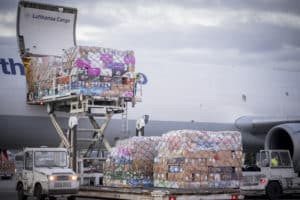The air cargo industry made sure that lovers around the world had the perfect flower for Valentine’s Day, transporting thousands of tonnes of produce in time for the big day.
Cargolux Airlines International added close to 1,200 tonnes of extra capacity to meet the peak demand, adding to the 20 weekly flights out of Nairobi, Quito and Bogota.
Kenya, Ecuador and Colombia are the most substantial providers of flowers, with Kenya catering for seven per cent of world trade, and European markets comprising of 35 per cent of Kenya’s flower harvest.
On top of the European and North American business, emerging economies in Asia are quickly becoming blossoming markets for flowers.
Flowers must be delivered to distribution centres in Europe within 48 hours of their harvest to preserve their condition, and Cargolux uses thermos blankets that ensure an additional protection for temperature sensitive shipments, while the fleet of Boeing 747 Freighters are equipped to transport perishable goods.
Cargolux product manager for fresh and temperature controlled commodities, Stavros Evangelakakis says: “We are operating a modern fleet which has the state-of-art thermal capabilities, in order to guarantee the reliable transport of flowers to lovebirds around the world. With our ’CV fresh‘ product, we offer to our clients a specialised product, which is focussing on the transport of perishable goods.”
 Lufthansa Cargo’s aircraft were filled with roses, transporting 800 tonnes of the delicate flowers this year, connecting flower-growing countries with its Frankfurt hub several times a week.
Lufthansa Cargo’s aircraft were filled with roses, transporting 800 tonnes of the delicate flowers this year, connecting flower-growing countries with its Frankfurt hub several times a week.
Maintaining constant temperatures is essential, and the roses are harvested several times a day at the flower farms where they are cultivated and then placed in water and cooled.
Following sorting and packing, the flowers are taken to the airport and loaded onto aircraft, and only remain in Frankfurt Airport for a short while before spreading the love across Europe.
LATAM Cargo was flying two million fresh flowers per flight during a four week period leading up to Valentine’s Day, with more than 163 freighters departing Ecuador and Colombia between 17 January and 7 February.
Traffic between Bogota and Miami rose to 2,670 tonnes per week compared to the usual 360 tonnes, and Quito – Miami rose from 450 tonnes to 3,740 tonnes.
The US is the principal market for LATAM Cargo, with Miami International Airport receiving 7,900 tonnes, and the Netherlands is another important destination for LATAM Cargo, especially from Ecuador, welcoming more than 690 tonnes, the equivalent of 15 flights.




